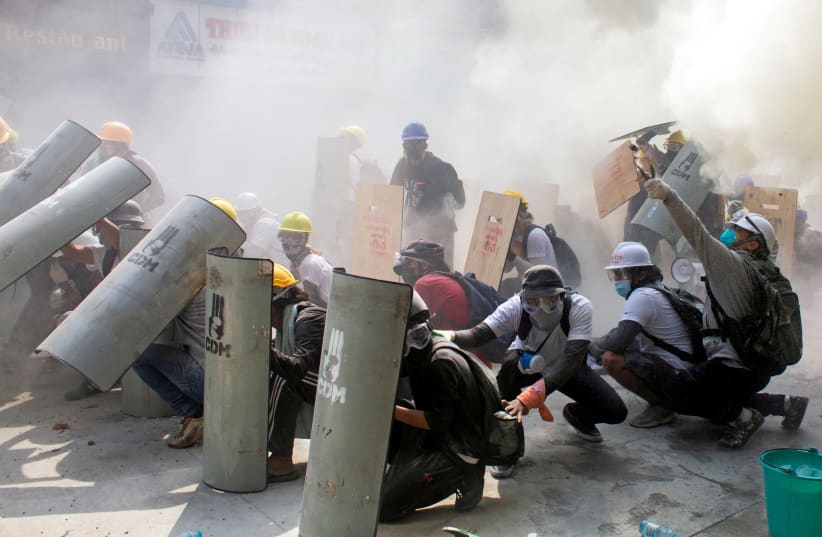An Iranian-born Israeli businessman who owns a controversial lobbying firm in Canada has recently been hired by Myanmar Defense Minister Mya Tun Oo to lobby several key international players in favor of the military junta, US-based independent news site Foreign Lobby reported on Friday.
Businessman Ari Ben-Menashe and his Montreal-based lobbying firm Dickens & Madson were hired to “assist in explaining the real situation in the country,” according to a consultancy agreement dated Thursday.
Foreign Lobby reported that the firm is tasked with lobbying figures in US Congress and in Joe Biden's administration as well as the governments of Saudi Arabia, the United Arab Emirates, Israel and Russia in addition to the United Nations, the African Union and other international organizations and NGOs.
Ben-Menashe told Foreign Lobby in a phone-call on Friday that he expects to file a formal lobbying contract with the US Department of Justice early next week, for an unspecified "big amount."
Ben-Menashe seems to be planning to present the country’s military rulers as a counter to what he alleged was growing Chinese influence in the country under the currently-imprisoned, Nobel Peace Prize-winning ousted leader of Myanmar, Aung San Suu Kyi.
“Aung San Suu Kyi moved toward China while she was in power,” Ben-Menashe said. “And these guys [in the military] don’t like it.”
His statement also included a very dubious accusation regarding Suu Kyii, in a clear attempt to shift blame away for a 2017 genocide of the Muslim Rohingya minority in the country.
“Aung San Suu Kyi as leader was the one who did in the Rohingyas, not the army,” he insisted.
Israel's Foreign Affairs Ministry (MFA) contradicted his claims after an inquiry by The Jerusalem Post on Saturday, saying "Suu Kyii did not know what was going on in the field during the Rohingya events in August-September of 2017."
The MFA said that ambassadors who served in Yangon had received two helicopter tours from the army in October 2017 and February 2018, wherein officials from Myanmar attempted - unsuccessfully, according to the MFA - to shift the blame for the burnt villages on local Rohingya resistance movements.
According to the MFA, the helicopter tours revealed remnants of former villages which had been "completely erased. The ground was leveled and you couldn't tell that there had ever been a village there.
Ben-Menashe said he based his claims on his time as an adviser for Myanmar's military dictatorship in the late 1990's. He said he had warned the country's rulers at the time that Suu Kyii had shown anti-Muslim animus.
Ben-Menashe has long been an infamous character in the arms trade and lobbying worlds. After immigrating to Israel with his parents in the 1960's, he was enlisted as a translator for IDF intelligence, later being promoted to work in IDF intelligence foreign relations.
In September 1986, Ben-Menashe gave information to Time correspondent Raji Samghabadi about weapons shipments to Iran organized by Richard Secord, Oliver North and Albert Hakim, which later became known as the Iran–Contra affair.
Time was unable to corroborate the allegations, and Ben-Menashe later passed the information to the Lebanese Ash-Shiraa magazine, which published them in November of 1986, leading to congressional investigations that corroborated the information.
Ben-Menashe later claimed that the leak was done on the orders of then-prime minister Yitzhak Shamir to embarrass his Labor Party rival, Shimon Peres.
He rose to prominence in 1989, after being arrested in the US for violating the Arms Export Control Act for trying to sell three Lockheed C-130 Hercules transport aircraft to Iran that used false end-user certificates.
While a 1990 article in The Jerusalem Post claimed that "the Defense establishment 'never had any contacts with Ari Ben-Menashe and his activities,' both the claim and the charges against him were later dropped after Ben-Moshe proved that he had in fact worked for Israeli intelligence.
He claimed that he had been personally involved in assisting Ronald Reagan's presidential campaign with its "October surprise" of preventing the American hostages from being released before the 1980 election, where he defeated President Jimmy Carter.
His claims of helping the Reagan campaign and of assisting in negotiation that helped eventually release the US Embassy employees were disproven in the following years.
He had also claimed that he had worked both for the Mossad and as a special advisor to then Prime Minister Yitzhak Shamir. Those claims would also turn out to be false, and filled with inconsistencies.
His stories had managed to fool several major news outlets around the world, leading him to even testify as an expert witness in US Congressional hearings in the early 1990's before being discredited in the US completely.
After being discredited in the States, Ben-Menashe moved to Australia, where he repeated similar patterns of handing inaccurate information to journalists before his asylum claims were denied.
He eventually moved to Canada, where he started his controversial lobbying firm, lobbying in favor of many of the most brutal dictatorships of the past three decades.
Beyond his previous representation of the Myanmar military dictatorship, he was also famously behind the disinformation campaign against the political opponent of then-embargoed dictator and president of Zimbabwe, Robert Mugabe.
Most recently, Ben-Menashe's Montreal based lobbying firm was hired by Sudanese General Mohamed Hamdan Dagalo in a $6 million deal, which critics dubbed "blood money," accusing Dagalo of pillaging the money during the country's civil war.
